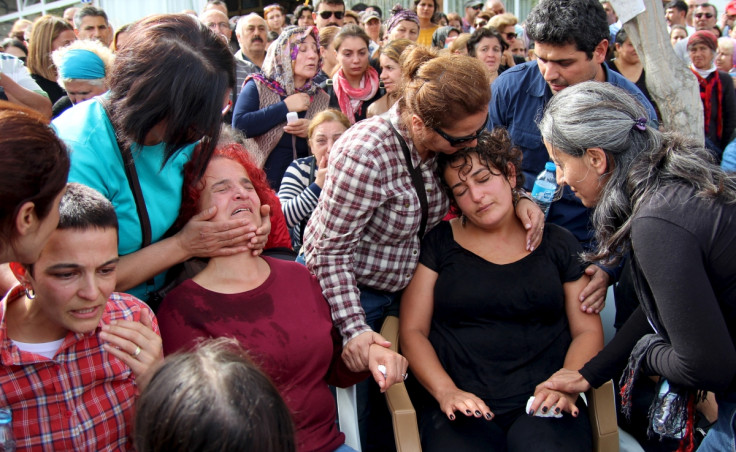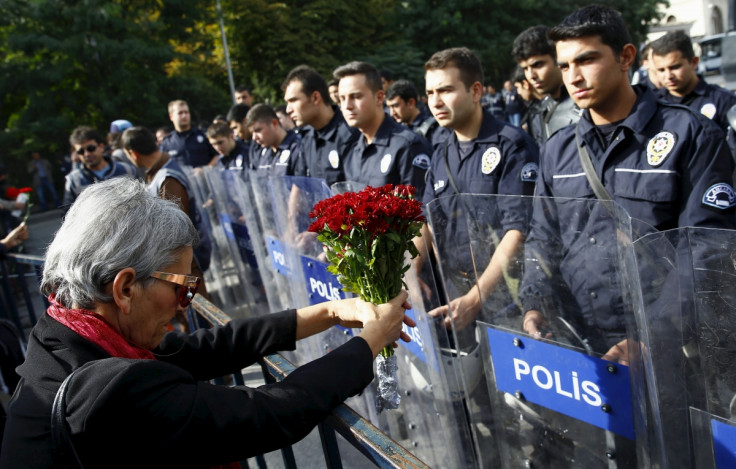Ankara bombing: Suicide attacks widen divisions between Erdogan and Kurds in a country on the brink

The double suicide bombing of a peace really in Ankara that killed at least 97 people comes at a critical time for Turkey's fragile democracy, deepening political polarisation in an already divided country.
Prime Minister Ahmet Davutoglu blamed Islamic State (Isis) for the attacks, which targeted protesters calling for peace with the Kurdish rebels of the PKK, claiming they were aimed to "cast a shadow" over Turkey's 1 November election and influence the result.
Senior security sources noted that the double bombings bore striking similarity to July suicide attack in Suruc, near the Syrian border, in which 32 young socialist activists were slaughtered and was also blamed on IS. Two male suicide bombers are thought to be responsible for the blast, in which TNT explosives packed with metal ball bearings were used.
However, the jihadist group, which usually boasts about its attacks on social media and through its media branch, has made no references so far about Suruc and Ankara.
Far from uniting the country, the worst attack in Turkey's modern history has poured salt on the open wounds of its democratic ideals. Thousands of people gathered near the site of the bombings, often breaking in anti-government chants and openly accusing "fascist" president Recep Tayyip Erdogan of being responsible of the attack and failing to protect the rally.
As riot police equipped with water cannons shut down a main highway leading to government buildings, the crowd chanted "Murderer Erdogan" and "murderer police". Leaders and members of the pro-Kurdish Peoples' Democratic Party (HDP) said they were attacked by police as they tried to leave carnations at the scene. Among them was Selahattin Demirtas, co-chairman of the HDP, who said the state was not able to prevent a massacre "right in the middle of Ankara". His party, which lost several key members, put the death toll at 128.
An HDP candidate from Istanbul, 45-year-old Kubra Meltem Mollaoglu, was among the victims along with Abdullah Erol, a father of two.

A charismatic, rising politician, Demirtas led the HDP in June elections to pass the threshold and enter Turkish parliament at expense of the ruling AKP, which lost its 13-year majority. After months of stagnating talks to form a coalition government, Erdogan called snap elections and intensified violence with the Kurds in an attempt to regain parliamentary majority by appealing to nationalist sentiment.
In the aftermath of the attack, the HDP, along with four unions, minority groups and leftist associations, pointed the finger at Erdogan, who is accused of raising tensions in the country to secure a majority.
Many witnesses and demonstrators said police had failed to provide security to protect the rally and even teargassed relatives of the victims as they arrived at the scene, a frequent characterisation of these rallies. Others said security forces were completely absent from the demonstration and only intervened after the attacks to fuel panic among the attendees.
Davutoglu said IS, Kurdish militant factions or the far-left may have been responsible for the attack, exposing the three enemies of the AKP party. Government officials have made clear that the elections will go ahead, although an HDP spokesman said the party had now cancelled all election rallies due to security fears.
Erdogan and his party have rejected any allegations, calling instead for unity against terrorist attacks by IS and the PKK. The government has been accused of exploiting the suicide attack on young activists in Suruc, across from the Syrian town of Kobane, for its political gains. Within days of the bombings, Turkey joined the US-led campaign against IS in Syria and started bombing the PKK in its territory and in Syria.
That raised fears of a full-scale civil war between the government and the Kurds, with hundreds of Turkish officials and civilians and 2,000 PKK militants killed since late July according to government figures. The PKK declared a unilateral ceasefire on Saturday to avoid influencing the elections in November, but Turkey has not responded so far.
On Sunday, two soldiers were killed during assaults against the separatist group and Turkish jets took aim at PKK camps in northern Iraq, killing a dozen militants. The conflict with the PKK has killed more than 40,000 people since 1984, and the recent unrest has put off peace negotiations that started three years ago.
© Copyright IBTimes 2024. All rights reserved.






